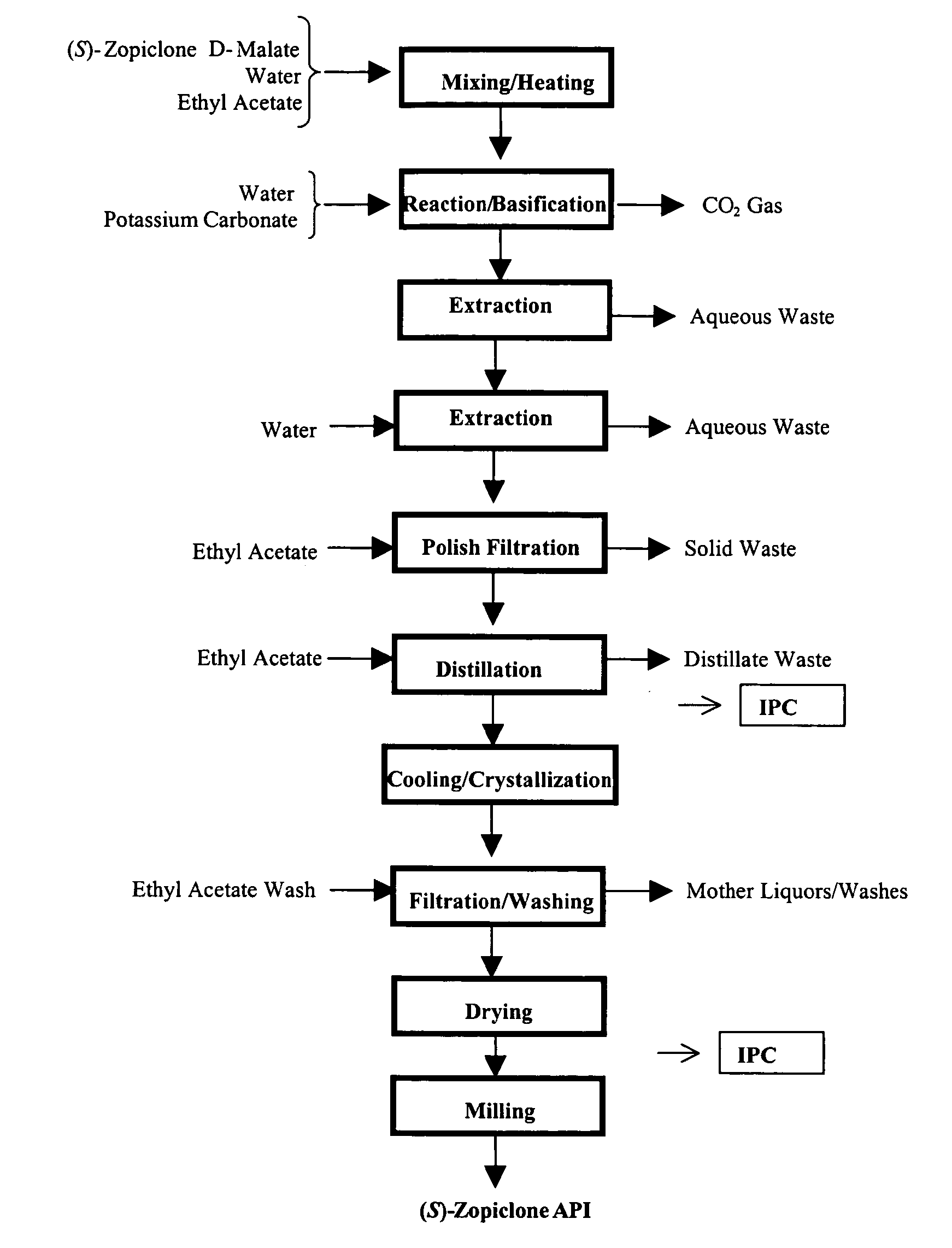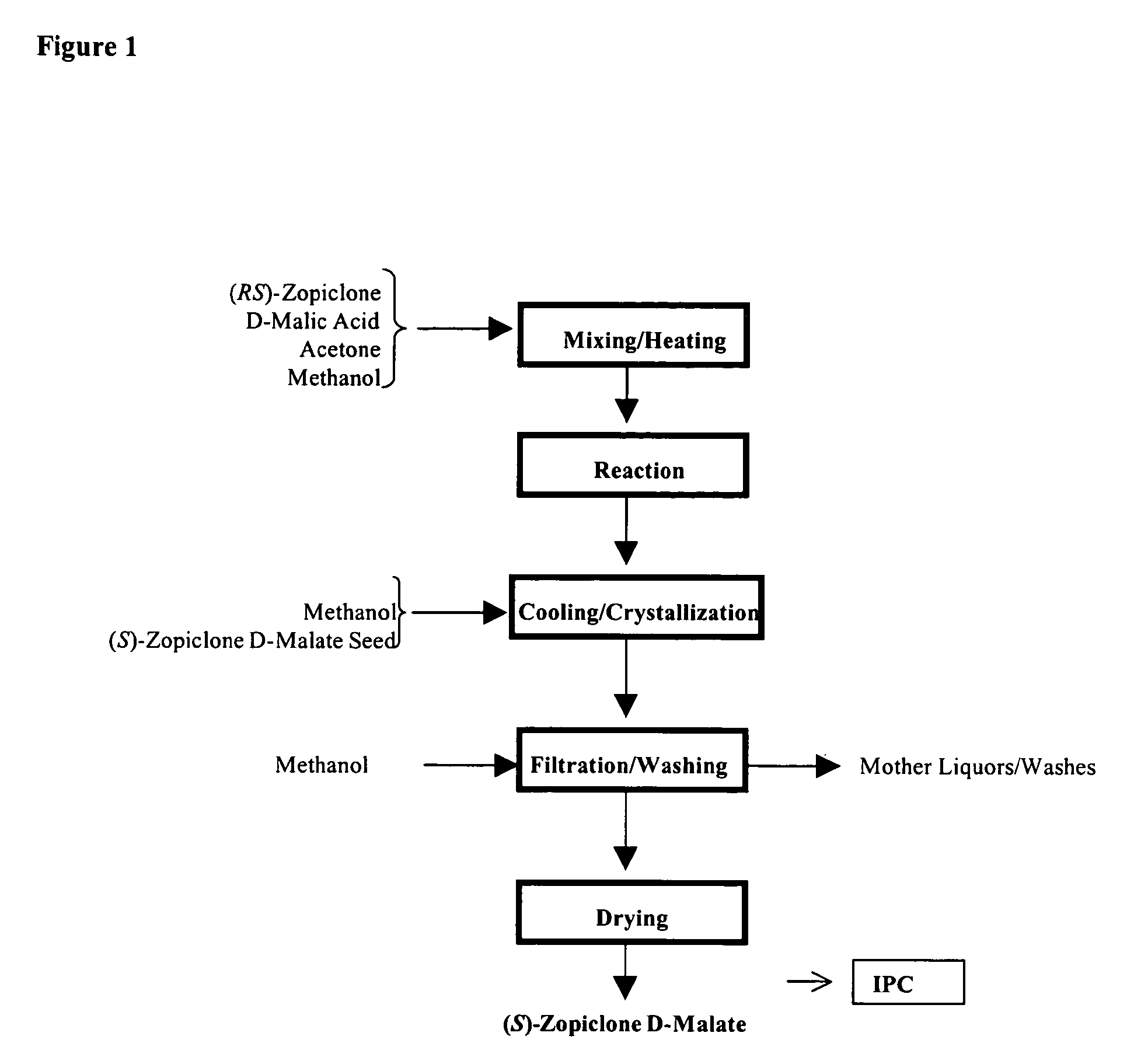Dopamine-Agonist Combination Therapy For Improving Sleep Quality
a combination therapy and sleep quality technology, applied in the direction of drug compositions, biocide, heterocyclic compound active ingredients, etc., can solve the problems of limiting the usefulness of certain patient populations, reducing the incidence of nighttime falls and/or amnesia, and chronic use is associated with a high potential for addiction involving both physical and psychological dependen
- Summary
- Abstract
- Description
- Claims
- Application Information
AI Technical Summary
Benefits of technology
Problems solved by technology
Method used
Image
Examples
example 1
Synthesis of Racemic Didesmethylsibutramine
[0335]An exemplary method of preparing racemic didesmethylsibutramine free base ((R / S)-DDMS) is described below.
[0336]A 1 L three-necked round bottom flask was charged with isobutyl magnesium bromide (200 mL, 2.0 M in diethyl ether) and toluene (159 mL), and the resulting mixture was distilled to remove most of the ether. After the mixture was cooled to 20° C., CCBC (50.0 g) in toluene (45 mL) was added, and the resulting mixture was refluxed for 2-4 hours. The reaction mixture was then cooled to 0° C. and methanol (300 mL) was added to it, followed slowly by NaBH4 (11 g). The resulting mixture was then added slowly to an aqueous HCl solution (365 mL, 2N) kept at 0° C., and the resulting mixture was warmed to room temperature with continual stirring. After separation of the organic phase, the aqueous phase was washed with toluene (200 mL). The combined organic phase were washed with water (200 mL) and concentrated to give (R / S)-DDMS (55 g, ...
example 2
Synthesis of Racemic Didesmethylsibutramine•(D)-Tartrate
[0337]An exemplary method of preparing the (D)-tartrate salt of racemic didesmethylsibutramine ((R / S)-DDMS•(D)-TA) is described below. The (L)-tartrate salt of racemic didesmethylsibutramine ((R / S)-DDMS•(L)-TA) can be prepared in an analogous manner.
[0338]A mixture of racemic didesmethylsibutramine (15.3 g) and toluene (160 mL) was heated to 70-80° C. and (D)-tartaric acid (9.1 g) in water (20 mL) and acetone (10 mL) was added slowly. The resulting mixture was refluxed for 30 minutes, after which the water and acetone were removed by distillation. The resulting mixture was cooled to room temperature to provide a slurry which was then filtered. The resulting wet cake was washed two times with MTBE (20 mL×2) and dried to yield (R / S)-DDMS•(D)-TA (22.5 g, 98%). NMR (DMSO-d6): 1H(δ), 0.6-0.92 (m, 6H), 0.92-1.1 (m, 1H), 1.1-1.3 (m, 1H), 1.5-1.8 (m, 2H), 1.8-2.1 (m, 1H), 2.1-2.4 (m, 3H), 2.4-2.6 (m, 1H), 3.4-3.6 (m, 1H), 3.9-4.2 (s, ...
example 3
Resolution of (S)-Didesmethylsibutramine•(L)-Tartrate
[0339]A method of isolating the (L)-tartrate salt of optically pure (S)-didesmethylsibutramine ((S)-DDMS•(L)-TA) from racemic didesmethylsibutramine free base is described below.
Formation of (L)-Tartrate Salt of (S)-DDMS
[0340](R / S)-DDMS (20.5 g), acetone / water / methanol (350 mL, 1:0.13:0.7, v:v:v) and (L)-tartaric acid (12.2 g) were added to a 500 mL three-necked round bottom flask. The mixture was heated to reflux for 30 minutes and then cooled to 45° C. The reaction mixture was then seeded with (S)-DDMS•(L)-TA (10 mg and 99.7% ee) and stirred at 40-45° C. for 30 minutes. The mixture was cooled to room temperature and stirred for 1 hour. The resulting slurry was filtered to provide a wet cake, which was washed with cold acetone / water and dried to give 10.8 g (33.4%) of (S)-DDMS•(L) TA (89.7% ee).
Preparation of (L)-Tartate Salt of (S)-DDM Sfrom Mother Liquor of (R)-DDMS•(D)-TA
[0341]A solution of DDMS tartrate in acetone / water / meth...
PUM
| Property | Measurement | Unit |
|---|---|---|
| time | aaaaa | aaaaa |
| half life | aaaaa | aaaaa |
| optical purity | aaaaa | aaaaa |
Abstract
Description
Claims
Application Information
 Login to View More
Login to View More - R&D
- Intellectual Property
- Life Sciences
- Materials
- Tech Scout
- Unparalleled Data Quality
- Higher Quality Content
- 60% Fewer Hallucinations
Browse by: Latest US Patents, China's latest patents, Technical Efficacy Thesaurus, Application Domain, Technology Topic, Popular Technical Reports.
© 2025 PatSnap. All rights reserved.Legal|Privacy policy|Modern Slavery Act Transparency Statement|Sitemap|About US| Contact US: help@patsnap.com



